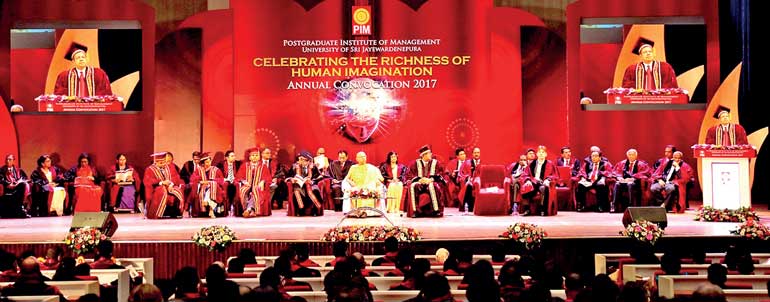Thursday Feb 19, 2026
Thursday Feb 19, 2026
Monday, 11 December 2017 00:00 - - {{hitsCtrl.values.hits}}

An annual convocation is an event to remember the social obligation we have in order to produce leaders of the right calibre to the nation. That’s how we at the Postgraduate Institute of Management (PIM) think. Once again, we celebrated the “richness of human imagination” when 366 extraordinary managers were conferred postgraduate degrees last week.
A convocation marks the end of one era and the beginning of another era of learning and applying. It is aptly termed in the West as commencement. Today’s column is a reflection of such a commencement where excellence is as essence in converting imagination into integrated action.
Keynote speaker
Prof. Michael O’Donnell, the Director of the Canberra Campus of the University of New South Wales (UNSW), Australia, was the keynote speaker of the PIM’s annual convocation this year. Prof. O’Donnell was an Associate Professor in the College of Business and Economics at the Australian National University. His research interests  include human resource practices and employment relations in the public sector and international employment relations.
include human resource practices and employment relations in the public sector and international employment relations.
His research has focused on performance management practices and the process of agency bargaining across the Australian Public Service, and recently on e-government initiatives in South Korea and the changing nature of the developmental state in South Korea and Malaysia.
Prof. O’Donnell has been the author of several monographs on unions and globalisation, labour in Korea and the management strategy in Hyundai. Interestingly, his forthcoming book explores the rise of South Korea’s popular music industry. He has published widely in management and employment relations journals, and presented in management conferences related to Australian Public Service on Industrial Action in the Australian Public Service. He has also has also published articles on human resource practices, and the garment industry in Sri Lanka.
Professor O’Donnell has been intensively engaged with PIM’s Research Centre. Having established PIM’s strong link with UNSW, He along with UNSW faculty has conducted a series of workshops for PIM’s PhD students, eight of whom are now doing Doctoral studies at UNSW Canberra on fully paid scholarships, each worth over AUS $250,000. This opportunity which Prof. O’Donnell initiated in 2015, will immensely contribute to the development of young academics in Sri Lanka.
Highlights of the keynote address
I felt Prof. O’Donnell’s speech was relatively brief but brilliant. His main focus was to highlight how innovation can assist in sustainability initiatives. I thought of sharing some extracts from his speech.
“I am delighted to have the opportunity to address this distinguished gathering of MBA, MPA and PhD graduates. I have worked for over three years with the Postgraduate Institute of Management on the development of PhD scholarship opportunities in Australia at the University of New South Wales, and it is a privilege to be able to celebrate the success of graduating students in Sri Lanka, and to acknowledge the hard work of former MBA graduates who are now completing their doctoral studies in Australia.”
“The world of business and the public sector that you are working in requires you to think creatively and to invent novel and useful ideas” observed Prof. Michael. “Innovation involves the successful implementation of these new ideas through the introduction of new products, services or processes within your organisations. Disruptive innovations are likely to have a significant influence on your careers following the completion of your MBA, MPA and doctoral studies, but they also present considerable opportunities for developing new business ventures and new services.”
“Disruptive innovations provide opportunities for smaller firms with limited resources to challenge more established firms, according to Clayton Christensen from the Harvard Business School,” he stated. “The opportunities for new firms arise where existing firms focus on providing products and services for their established and profitable customers but overlook other less profitable customers.”
As he further elaborated: “The internal processes and routines developed by established firms to cater to the demands of their more profitable existing customers makes it difficult for them to respond in a timely or agile manner to the market disruptions caused by new and innovative firms. They tend to focus on improving existing products and services rather than inventing completely new ones, or developing cheaper alternatives for new and existing customers.”
“This provides an opportunity for new firms to establish themselves in existing markets, or to develop new products and services for new markets,” observed Prof. O’Donnell. “If these new firms survive the challenges of market entry, they can begin the journey of building their business and providing valued products and services to customers. Disruption occurs when large numbers of these customers begin using the products or services developed by these new market entrants.”
“The iPhone is an example of disruptive innovation,” remarked Prof. O’Donnell. “When it was launched in 2007 it targeted the same customers as other leading mobile phone companies. However, the iPhone caused disruption to the laptop computer industry because it provided an alternative and more flexible means to access the internet for many consumers. The iPhone’s disruption was underpinned by software application developers who provided consumers with more convenient means of accessing the internet and maintaining contact with family, friends and work colleagues. There are many examples of disruptive innovations in industries that include retail, motorcycles, automobiles, financial services, management consulting and higher education according to Christensen. One way in which firms can respond to such disruptions is by tapping into the creativity and imagination of their human resources.”
“Being self-motivated and excited by the challenge of working on an important problem is also important, as is being prepared to take risks and look at issues differently and in new ways. Being willing to work in a team, to collaborate and to listen to the ideas of others is also critical. You will be most motivated when you are interested in your work and experience a sense of enjoyment and challenge from the development and implementation of new ideas.”
As Prof. O’Donnell observed: “The social environment you establish in your workplace is also critical to the fostering of a culture of creativity. Research highlights factors such as psychological safety, autonomy, developmental feedback and creativity goals that all facilitate the growth of creativity within the workplace.”
“Psychological safety occurs where people believe that they can ask questions, admit mistakes or suggest out of the ordinary ideas in a safe environment knowing that their colleagues and managers will respond in a supportive and positive manner. This highlights the importance of trust within workgroups if you wish to encourage people to experiment with new and novel ideas without fear of being punished or reprimanded.”
“Ensuring staff have a sense of autonomy in their work is another important element of a work environment that fosters creativity. If employees believe that they have some genuine control over their work, they are more likely to be motivated to solve problems at work in new and novel ways.”
“The manner in which feedback on task performance is provided is also critical for fostering creativity. Feedback that is developmental and which encourages employees to develop their creative capabilities, to learn and to make improvements is more likely to promote the development of new ideas. Setting clear goals for employees as they undertake work projects is also likely to support creativity. The requirement to demonstrate creative problem-solving skills is important for private and public sector workers and managers.”
“One example of these changes is the trend in many Western countries towards personalised care for citizens with disabilities being delivered through a market approach rather than directly through public agencies,” observed Prof. O’Donnell. “In Australia this approach is occurring through the National Disability Insurance Scheme, which costs over $20 billion per annum to operate.”
“The problems involved in managing the contracting out of service delivery and the challenge of effectively regulating of markets will test the imagination and ingenuity of all those graduating with an MPA degree, and also many MBA students who may see new business opportunities in these new markets.”
As Prof. O’Donnell mentioned: “There will be an ongoing need for you to be innovative in the implementation of new ideas, products and processes in both private and public sector contexts, and to apply the learning and encouragement of human imagination instilled in you by your academic teachers at the PIM.”
“The awarding of your degree represents a continuation of your journey of learning, imagination, creativity and innovation,” observed he. “I am certain that what you have gained from your degree will enhance your opportunities to apply this knowledge to address many of the business and governmental challenges facing Sri Lanka, and to make a positive contribution to your communities,” Prof. O’Donnell concluded.
Way forward
As Aristotle said, roots of education are bitter but the fruits are sweet. The convocation day was a time of tasting that sweetness. A premier postgraduate program should have high quality and relevance. That’s what we at PIM are continuously striving for.
I earnestly hope that the 366 private sector managers and the public sector administrators who graduated will contribute their utmost towards the betterment of themselves, their respective organisations, and the nation at large. That’s how we reap the richness of resourcefulness.
(Prof. Ajantha Dharmasiri can be reached through [email protected], [email protected] or www.ajanthadharmasiri.info.)